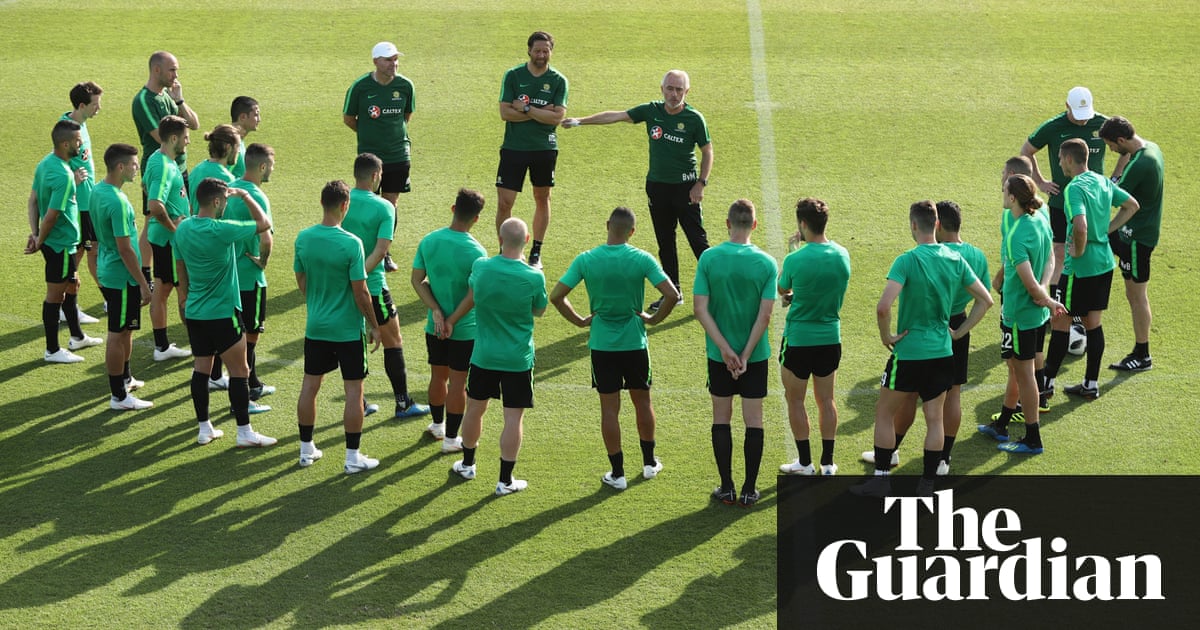Ahead of Australia’s fifth World Cup participation, starting with a tough opener against France on Saturday, it’s hard to articulate the precise mood or narrative surrounding Bert van Marwijk’s Socceroos.
The remarkable story of the trailblazers of 1974 has been well documented: Australia’s first and only successful involvement over the first 17 iterations of this unique global sporting spectacular.
Pioneers that escaped the mire of Australian football, with its peripheral place in our collective affection and its seemingly endemic organisational dysfunction, they were a tight-knit collective bound together in financial sacrifice and wrought strong in the theatre of conflict.
Stories such as of Manfred Schaefer, the part-time footballer and full-time milkman, facing his countrymen and great celebrities of the age, Gerd Müller and Franz Beckenbauer, have attained an iconic place in the hearts of Australian football fans. Larger than life characters like Rale Rasic and Johnny Warren went on to become the figureheads of a game forever agitating for its place in the popular consciousness.
Sign up to receive the latest Australian sports stories every day
Fast forward to that fateful night in November 2005 and with John Aloisi’s successful penalty Australian football had discovered a second foundational myth, and one for a generation of fans that were oblivious to the troubles of the NSL (some real, some perceived), and weaned on the arrival of football as a “mass entertainment product” neatly packaged in the A-League.
With the arrival of Guus Hiddink an unimportant nation in world football was cast into the limelight. The harrowing defeat to Iran in 1997 was expunged from our collective memories, and the cavalcade of calamities accrued across seven consecutive failed campaigns were consigned to history’s dustbin.
The 2006 World Cup campaign was exhilarating: a first World Cup goal; a first World Cup win. The madness of Croatia, Graham Poll and Aussie Jo Šimunić. The disaster and injustice of Fabio Grosso.
With the transfer to Asia and its supposed “easier” qualification path, 2010 had an air of denouement, and yet with Harry Kewell, Lucas Neill and half of the Golden Generation some frisson still remained. Qualification ties against Argentina or Uruguay were replaced with fixtures against Qatar and Uzbekistan, and even our Dutchman felt cut from less exalted cloth.
Pim Verbeek’s infamous white flag of a formation – the 4-6-0 rolled out against and subsequently rolled over by Germany, lay the scene for an on-air evisceration from Craig Foster and ironically given their shared history, laid the path for the emergence of Ange Postecoglou.
By the time the “second Pim Verbeek”, Holger Osieck, had been sent packing the clamour was deafening. No more pragmatic conservatism, Australia stands on its feet in world football, or not at all.
Handed another Group of Death at World Cup 2014, expectations were low for Postecoglou’s relatively unheralded squad; and yet through the verve and gusto with which they took on first Chile and then the Netherlands it seemed another exciting chapter of Australian football was being written.
No longer willing just to exist as a second-tier football nation, Postecoglou’s attacking philosophy and will to take on the world’s best playing aggressive, attractive football garnered international praise, and culminated in continental triumph at the 2015 Asian Cup.
Which brings us to Russia 2018 and Australia’s fifth World Cup appearance.
As they limped through qualification, failing to attain direct passage from Group B and riding their luck in last-minute drama against Syria, the sheen was wearing off the Postecoglou revolution. The coach seemed jaded and irritable, the players appeared jaded and irritable, and the press pack were absolutely jaded and irritable.
From the tenor of the general discussion, it appears for the first time in their history Australia enter a World Cup amid low public confidence, with a squad that pales in comparison with more illustrious cohorts like 2006 and 2010, and with a coach whose short-term mandate and general demeanour fails to inspire.
But this general malaise speaks more to the context of Football Federation Australia’s ongoing congressional ructions, the perceived stagnation of the A-League in recent seasons and the complacency of the Australian public after four consecutive qualifications. And it’s a circumstance that creates the slightest space for optimism.
From Cameroon beating Argentina in 1990, Senegal shocking defending champions France in 2002, to Costa Rica upsetting Italy in 2014, the World Cup is littered with upsets in a game that despite all its sophistication and investment still remains two teams of 11 v 11.
Against the condemnation of Van Marwijk’s perceived overly-pragmatic style – let’s remember the recent friendlies against the Czech Republic and Hungary were just his third and fourth games so far (games the Dutchman explicitly didn’t want and would have preferred training time instead) – set the fact that this is a coach who has taken a squad of players all the way to a World Cup final.
With swirling discontent about commercial imperatives trumping team selection, remember that, if selected, in Tim Cahill Australia still have a genuine world-stage performer, and players like Mat Ryan and Aaron Mooy perform week-in, week-out under the unforgiving spotlights of the Premier League.
Players like Robbie Kruse, Mat Leckie even Tom Rogic may not have yet hit the heights of Harry Kewell or Mark Viduka in an Australian shirt, but funny things happen at World Cups.
The Socceroos of 2018 don’t have a ready narrative like their storied predecessors, and it could well transpire that with poor performance the sands of time will come to cover their exploits almost entirely.
But in the absence of genuine expectations or a burden of history, there’s fertile wriggle room to write their own chapter. Who knows, even a new and exciting one to enhance Australian football folklore.


